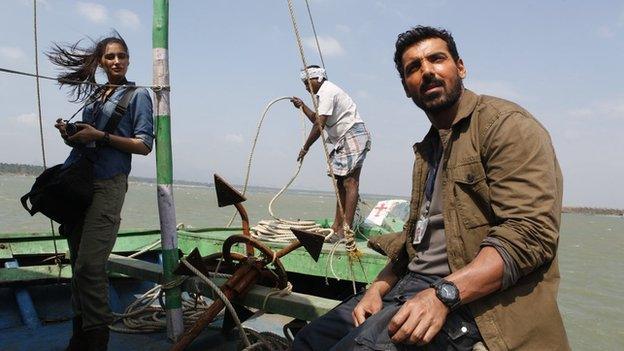Madras Cafe: Bollywood film stirs up a storm in India
- Published

Actors John Abraham and Nargis Fakhri play the lead in Madras Cafe
Bollywood's big cinema release this week, the spy thriller Madras Cafe, has caused controversy in India with Tamil groups demanding a ban. Geeta Pandey in Delhi meets the film's director and lead actors to find out what the row is all about.
Watching the official trailer of the film, it is obvious that the conflict in Sri Lanka and the assassination of former Indian Prime Minister Rajiv Gandhi is its central theme.
The film is set in the late 1980s and early 1990s and includes the time when Mr Gandhi was assassinated by Sri Lanka's Tamil Tiger rebels in 1991 at an election rally in the southern state of Tamil Nadu.
Director Shoojit Sircar describes the film, which will be released across India and many parts of the world on 23 August, as "an espionage thriller", but concedes that it draws from real-life events.
Watch the official trailer video of Madras Cafe film
"The film is a work of fiction, but it is based on research into real events, it has a resemblance to actual political events, dealing with civil war and the ideology of a rebel group.
"The film revolves around important events that changed the political history of India," he says.
Uncanny resemblance
John Abraham, the lead actor, plays intelligence agent Major Vikram Singh who is sent to Jaffna (in northern Sri Lanka) against the backdrop of the civil war and becomes entangled in rebel and military politics.
In the process he discovers a plot to assassinate "a former Indian prime minister".
Mr Sircar agrees that the rebel leader in the film bears an uncanny resemblance to Tamil Tiger rebel group leader Vellupillai Prabhakaran, while the actor playing the former prime minister looks like Rajiv Gandhi. But he says that "such resemblances are coincidental".
But even before its release, the film has run into controversy. Tamil groups and politicians in the southern state of Tamil Nadu denounced it as "anti-Tamil" and vowed to stop its release in the state.
The film is based on the civil war in Sri Lanka in the late 1980s and early 1990s
A special screening, arranged for some of the protesters earlier this week, failed to pacify them. Many insist that it depicts the Tamil Tigers and Prabhakaran in a bad light.
"The aim of the movie is to portray Prabhakaran as a villain. We cannot accept the movie in any form," Seeman, leader of Tamil group Naam Tamizhar Katchi, said.
"The heart of the film is anti-Tamil," he added, urging cinema halls in the state not to screen the film.
A petition has been filed in the Madras high court which also seeks a ban.
'Disappointed'
The petitioner, lawyer B Stalin, alleges that the film portrays Tamils as "terrorists" and that its screening might lead to law and order problems.
Abraham, who has also produced the film, says he is "very disappointed and disturbed" by the allegations.
"I believe it to be a very pro-Tamil film and it was not made to hurt anyone's sentiments," the actor told the 大象传媒.
"We did not make the film to create a controversy."
Director Sircar says the film "does not take any sides" and focuses solely on the civil war.
The rebel leader bears an uncanny resemblance to the Tamil Tiger leader Vellupillai Prabhakaran
"I am proud that we made this film," he says, describing Madras Cafe as "a hard-hitting [and] realistic film".
"We've seen movies on [the] India-Pakistan and Afghanistan [conflicts], but we've not seen any film based on the civil war in Sri Lanka," he says.
The film's lead actress Nargis Fakhri says the film is made in Bollywood, but has a "very international appeal".
Fakhri, an American citizen of Pakistani-Czech parentage, plays a journalist in the film.
"Playing a war correspondent was not easy, it needed a lot of research. It's a very realistic role," she says.
The movie, though based in Sri Lanka, was never filmed there - most took place in Kerala and in coastal Tamil Nadu with some bits shot in London, Malaysia, Thailand and elsewhere.
The producers, however, say they are in talks to release it in Sri Lanka too.
"We've been approached by distributors in Sri Lanka and we hope to release it there soon," Mr Abraham said.
- Published23 August 2013